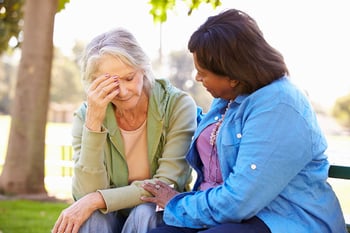Grief and Bereavement Care
Bereavement Care Information
Bereavement care is designed to assist you in recognizing your strengths, navigating difficulties, managing stressors, and developing coping skills essential for adapting to a significant loss in your life. While many individuals use the terms grief and bereavement interchangeably, they carry distinct meanings. Grief is a natural response to loss, while bereavement specifically refers to the period following a loss during which you undergo the experience of grief. Understanding this distinction is crucial, as loss is an inevitable part of life, and everyone will encounter grief in response to various losses. This is where the value of bereavement care becomes evident.
What does bereavement care entail?
A well-designed bereavement care program aids in comprehending your responses to loss and extends support to help you navigate through grief. Emotional, physical, social, and spiritual reactions are common, including emotions like anger, guilt, anxiety, sadness, and despair. Physical responses may manifest as sleep disturbances, changes in appetite, physical ailments, or illness. Importantly, each person's response to loss is unique. Trained bereavement professionals can assess your coping mechanisms and provide education and support. Learning about grief, understanding its impact, identifying coping strategies, and acquiring new methods for navigating the grief experience often leave individuals feeling strengthened, encouraged, and supported. For those grappling with complicated grief, a bereavement care professional can identify the need for more comprehensive support.
How to find bereavement care
Locating bereavement care services is often possible through community hospice programs, which are valuable resources within local communities. While hospice programs primarily focus on patients and their families, they frequently extend support to individuals in the broader community who may not have directly received hospice care services. If a hospice's bereavement program cannot fulfill your specific needs, they can often guide you toward other community resources.
Bereavement care under hospice care
Under the Medicare hospice benefit, family caregivers or those closely connected to a hospice patient have access to bereavement care for 13 months following the patient's death. Services offered include support groups, memorial services, informational and educational resources, counseling, and referrals to relevant therapeutic and community resources. These hospice bereavement programs cater to the diverse needs of individuals, aiming to facilitate healthy grieving and prevent grief-related health and mental health issues.
Grief Resources
Grief Support Groups
Support for individuals navigating the grieving process after the loss of a beloved person.

What is Grief?
Grief is the emotional response to loss, encompassing a range of feelings such as sadness, anger, and despair, and affecting daily life and health. It is a personal and natural process that helps individuals come to terms with their loss & honor the memory of what was lost.

Coping with Grief
Support for individuals navigating the grieving process after the loss of a beloved person.

Ways to Support a Grieving Loved One or Friend
Do you know someone who is grieving?

Children and Grief
Each child is unique in his or her understanding of death and response to grief.

Refer a Patient
Our hospice teams specialize in end-of-life care, providing compassionate support to patients and families facing advanced illness and guiding them through healthcare transitions in alignment with their goals, wishes, and values.

Online Grief Resources
For Crisis Support
- Mental Health/Suicide Crisis
(National 3 digit code): 988 - Ramsey County Children's Mental Health
Crisis Line: (651) 266-7878 - Ramsey County Adult's Mental Health
Crisis Line: (651) 266-7900 - Crisis Text Line: Text 741741 or visit https://www.crisistextline.org/text-us/
If you need a different kind of support, the resources below may be helpful:
- Empact Suicide/Crisis Hotline:
(480) 784-1500 - National Suicide/Crisis Hotline:
(800) 273-8255 - Teen Life-Line phone or text:
(602) 248-TEEN (8336)
- Veterans Crisis Line:
(800) 273-8255 (press 1) - Be Connected:
(866) 4AZ-VETS (429-8387) - National Domestic Violence Hotline:
(800) 799-7233